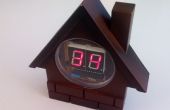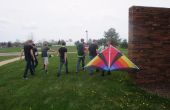Stap 3: programmeren
Nadat u hebt uw circuit aangesloten, is het tijd om het uploaden van de code naar de Arduino, de code bevat het "pitches.h" Library, dus zorg ervoor dat u de bibliotheek binnen dezelfde map als de map van de code E-Piano.
De code maakt voornamelijk gebruik van de methode ClickButton() om te bepalen welke knop is ingedrukt om te spelen van een bepaalde frequentie. De frequenties van Do Re Mi Fa Sol La Si zijn toegewezen in de matrix melody1 []. Ze zijn niet 100% nauwkeurig, dus u ze houden kalibreren kunt totdat u een beter resultaat te krijgen. Als u wilt een beter gekalibreerd muzieknoten delen, kunt u uw melody1 array boeken in de commentaren hieronder sectie.
De Toon-methode wordt gebruikt voor het verzenden van de PWM naar de luidspreker, zij loopt twee parameters, de pin van de spreker en de toonhoogte. U kunt de noTone(Speaker Pin #) geen notities afspelen beëindigen.
De volgende code uploaden naar de Arduino te gebruiken uw E-Piano. Zorg ervoor dat u de "pitches.h"-library downloaden en bewaar deze in dezelfde map als uw code.
/* Developed in Fablab DHAHRAN - Mado * www.fablabdhahran.org * * Special thanks to PrinceTronics for their SuperMarioBros Theme melody * http://www.princetronics.com/supermariothemesong/ */
#include "pitches.h" #define melodyPin 3
int Do = 4; int Re = 5; int Mi = 6; int Fa = 7; int Sol = 8; int La = 9; int Si = 10; int Marioo = 11;
int LED_SYNC = 13;
const int Delay = 120;
int Speaker = 3;
int melody1[] = {NOTE_C4, NOTE_D4,NOTE_E4, NOTE_F4, NOTE_G4, NOTE_A4, NOTE_B4, NOTE_C5}; int melody[] = { NOTE_E7, NOTE_E7, 0, NOTE_E7, 0, NOTE_C7, NOTE_E7, 0, NOTE_G7, 0, 0, 0, NOTE_G6, 0, 0, 0, NOTE_C7, 0, 0, NOTE_G6, 0, 0, NOTE_E6, 0, 0, NOTE_A6, 0, NOTE_B6, 0, NOTE_AS6, NOTE_A6, 0, NOTE_G6, NOTE_E7, NOTE_G7, NOTE_A7, 0, NOTE_F7, NOTE_G7, 0, NOTE_E7, 0, NOTE_C7, NOTE_D7, NOTE_B6, 0, 0, NOTE_C7, 0, 0, NOTE_G6, 0, 0, NOTE_E6, 0, 0, NOTE_A6, 0, NOTE_B6, 0, NOTE_AS6, NOTE_A6, 0, NOTE_G6, NOTE_E7, NOTE_G7, NOTE_A7, 0, NOTE_F7, NOTE_G7, 0, NOTE_E7, 0, NOTE_C7, NOTE_D7, NOTE_B6, 0, 0 }; //Mario main them tempo int tempo[] = { 12, 12, 12, 12, 12, 12, 12, 12, 12, 12, 12, 12, 12, 12, 12, 12, 12, 12, 12, 12, 12, 12, 12, 12, 12, 12, 12, 12, 12, 12, 12, 12, 9, 9, 9, 12, 12, 12, 12, 12, 12, 12, 12, 12, 12, 12, 12, 12, 12, 12, 12, 12, 12, 12, 12, 12, 12, 12, 12, 12, 12, 12, 12, 9, 9, 9, 12, 12, 12, 12, 12, 12, 12, 12, 12, 12, 12, 12, }; //Underworld melody int underworld_melody[] = { NOTE_C4, NOTE_C5, NOTE_A3, NOTE_A4, NOTE_AS3, NOTE_AS4, 0, 0, NOTE_C4, NOTE_C5, NOTE_A3, NOTE_A4, NOTE_AS3, NOTE_AS4, 0, 0, NOTE_F3, NOTE_F4, NOTE_D3, NOTE_D4, NOTE_DS3, NOTE_DS4, 0, 0, NOTE_F3, NOTE_F4, NOTE_D3, NOTE_D4, NOTE_DS3, NOTE_DS4, 0, 0, NOTE_DS4, NOTE_CS4, NOTE_D4, NOTE_CS4, NOTE_DS4, NOTE_DS4, NOTE_GS3, NOTE_G3, NOTE_CS4, NOTE_C4, NOTE_FS4, NOTE_F4, NOTE_E3, NOTE_AS4, NOTE_A4, NOTE_GS4, NOTE_DS4, NOTE_B3, NOTE_AS3, NOTE_A3, NOTE_GS3, 0, 0, 0 }; //Underwolrd tempo int underworld_tempo[] = { 12, 12, 12, 12, 12, 12, 6, 3, 12, 12, 12, 12, 12, 12, 6, 3, 12, 12, 12, 12, 12, 12, 6, 3, 12, 12, 12, 12, 12, 12, 6, 6, 18, 18, 18, 6, 6, 6, 6, 6, 6, 18, 18, 18, 18, 18, 18, 10, 10, 10, 10, 10, 10, 3, 3, 3 }; void setup(void) { Serial.begin(9600); pinMode(LED_SYNC, OUTPUT); pinMode(melodyPin, OUTPUT);//buzzer pinMode(Do, INPUT); pinMode(Re, INPUT); pinMode(Mi, INPUT); pinMode(Fa, INPUT); pinMode(Sol,INPUT); pinMode(La, INPUT); pinMode(Si, INPUT); pinMode(Marioo,INPUT); } void loop() { ClickButton(); } int song = 0; void sing(int s) { song = s; if (song == 2) { Serial.println(" 'Underworld Theme'"); int size = sizeof(underworld_melody) / sizeof(int); for (int thisNote = 0; thisNote < size; thisNote++) { // to calculate the note duration, take one second // divided by the note type. //e.g. quarter note = 1000 / 4, eighth note = 1000/8, etc. int noteDuration = 1000 / underworld_tempo[thisNote]; buzz(melodyPin, underworld_melody[thisNote], noteDuration); // to distinguish the notes, set a minimum time between them. // the note's duration + 30% seems to work well: int pauseBetweenNotes = noteDuration * 1.30; delay(pauseBetweenNotes); // stop the tone playing: buzz(melodyPin, 0, noteDuration); } } else { Serial.println(" 'Mario Theme'"); int size = sizeof(melody) / sizeof(int); for (int thisNote = 0; thisNote < size; thisNote++) { // to calculate the note duration, take one second // divided by the note type. //e.g. quarter note = 1000 / 4, eighth note = 1000/8, etc. int noteDuration = 1000 / tempo[thisNote]; buzz(melodyPin, melody[thisNote], noteDuration); // to distinguish the notes, set a minimum time between them. // the note's duration + 30% seems to work well: int pauseBetweenNotes = noteDuration * 1.30; delay(pauseBetweenNotes); // stop the tone playing: buzz(melodyPin, 0, noteDuration); } } } void buzz(int targetPin, long frequency, long length) { digitalWrite(13, HIGH); long delayValue = 1000000 / frequency / 2; // calculate the delay value between transitions //// 1 second's worth of microseconds, divided by the frequency, then split in half since //// there are two phases to each cycle long numCycles = frequency * length / 1000; // calculate the number of cycles for proper timing //// multiply frequency, which is really cycles per second, by the number of seconds to //// get the total number of cycles to produce for (long i = 0; i < numCycles; i++) { // for the calculated length of time... digitalWrite(targetPin, HIGH); // write the buzzer pin high to push out the diaphram delayMicroseconds(delayValue); // wait for the calculated delay value digitalWrite(targetPin, LOW); // write the buzzer pin low to pull back the diaphram delayMicroseconds(delayValue); // wait again or the calculated delay value } digitalWrite(13, LOW); } void ClickButton(){ if(digitalRead(Do) == 1){ Serial.println("DO"); digitalWrite(LED_SYNC, HIGH); tone(Speaker, melody1[0]); delay(Delay); }else if(digitalRead(Re) == 1){ Serial.println("RE"); digitalWrite(LED_SYNC, HIGH); tone(Speaker, melody1[1]); delay(Delay); }else if(digitalRead(Mi) == 1){ Serial.println("MI"); digitalWrite(LED_SYNC, HIGH); tone(Speaker, melody1[2]); delay(Delay); }else if(digitalRead(Fa) == 1){ Serial.println("FA"); digitalWrite(LED_SYNC, HIGH); tone(Speaker, melody1[3]); delay(Delay); }else if(digitalRead(Sol) == 1){ Serial.println("SOL"); digitalWrite(LED_SYNC, HIGH); tone(Speaker, melody1[4]); delay(Delay); }else if(digitalRead(La) == 1){ Serial.println("La"); digitalWrite(LED_SYNC, HIGH); tone(Speaker, melody1[5]); delay(Delay); }else if(digitalRead(Si) == 1){ Serial.println("Si"); digitalWrite(LED_SYNC, HIGH); tone(Speaker, melody1[6]); delay(Delay); }else if(digitalRead(Marioo) == 1){ Serial.println("Marioo"); digitalWrite(LED_SYNC, HIGH); sing(1); sing(2); delay(Delay); }else{ digitalWrite(LED_SYNC, LOW); noTone(Speaker); } }













